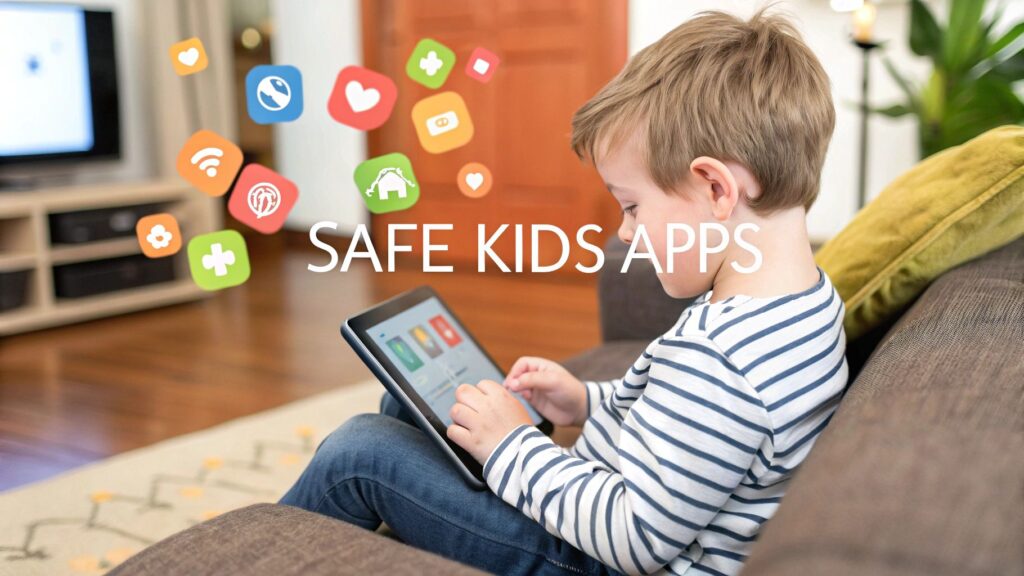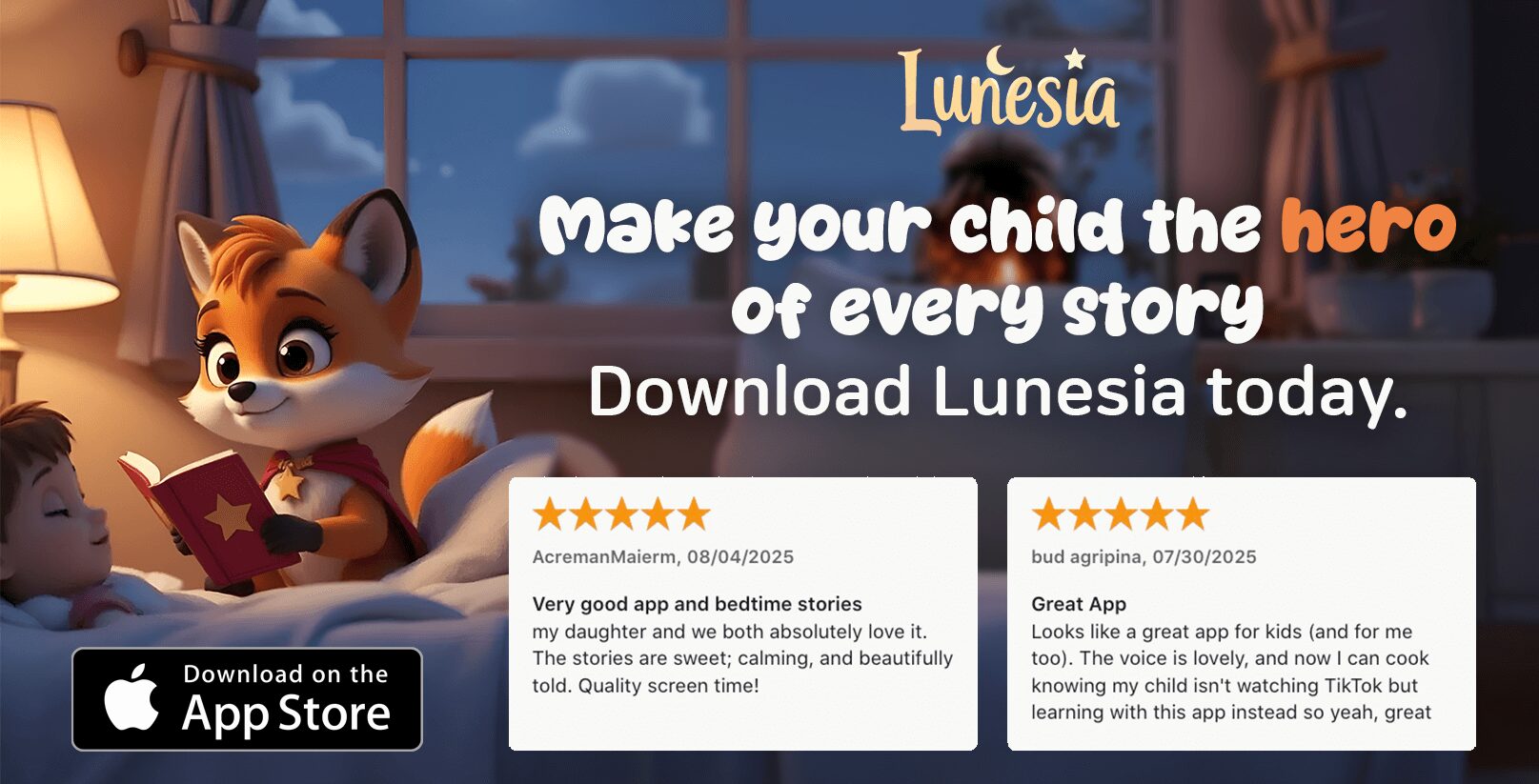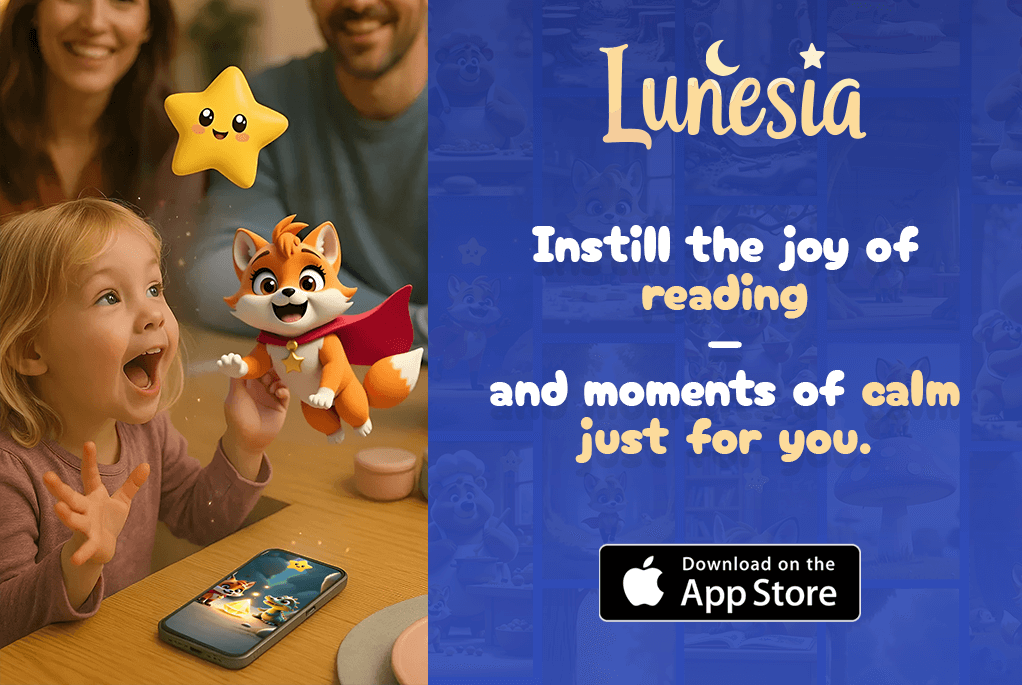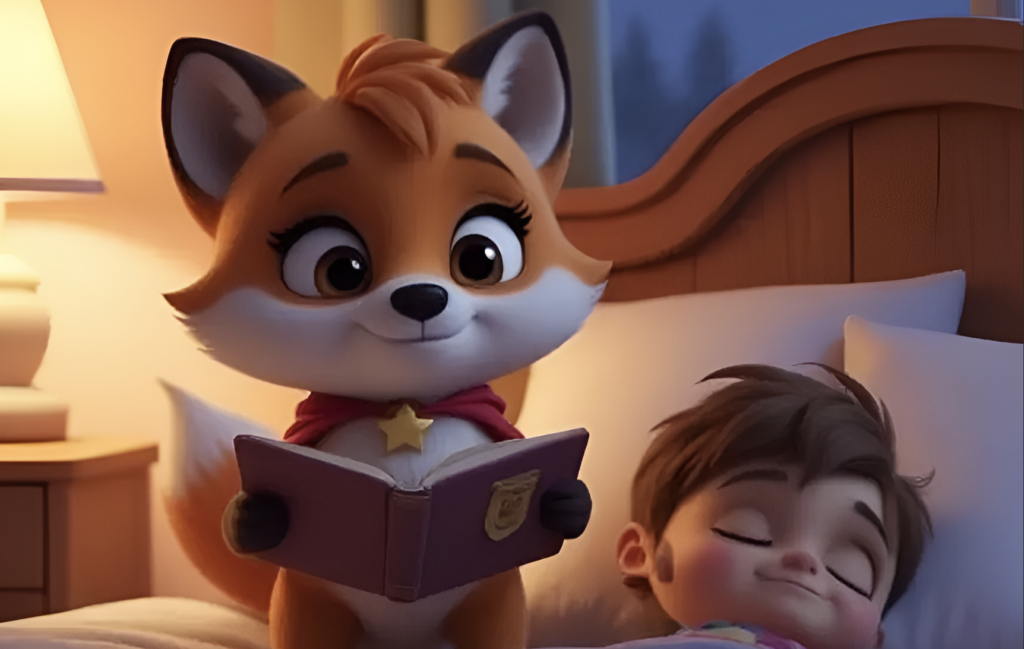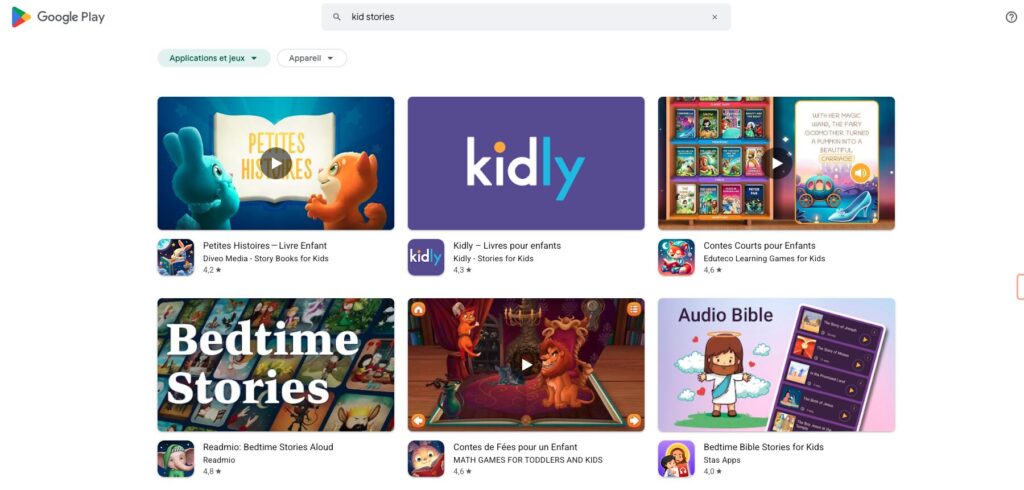Searching for the best apps for 3 year olds feels like looking for more than just a digital babysitter, doesn't it? You want something that’s not only safe and high-quality but actually helps your child grow. The best apps are always ad-free, spark creativity with clever challenges, and even build crucial emotional skills. Apps like Lunesia are leading the way, transforming screen time into the kind of meaningful, guilt-free learning adventure every parent dreams of.
Your Guide to Choosing the Right Apps for Your 3-Year-Old
Ever feel a little lost in the endless sea of kids' apps? You’re not alone. The digital world for our little ones has exploded, with the global market for kids' apps projected to jump from $2.2 billion in 2025 to over $16 billion by 2033. That flood of options can feel overwhelming, but it also means there are some truly incredible tools out there—if you know what to look for. You can see the full breakdown in this Apps for Kids market report.
Think of this guide as your personal map. We'll cut through the marketing noise to show you what truly matters—from apps that ignite creativity to those that build real emotional intelligence. It's all about helping you make confident, guilt-free choices that feel right for your family.
Finding More Than Just a Digital Toy
What if an app could do more than just keep your child busy? What if it could help them figure out how to handle a disagreement at the playground, or find the courage to try something new? That’s where the real magic is. A meltdown at the grocery store isn't just about a candy bar; it's about big feelings that need a name and a safe place to be explored.
The right app can be a powerful practice ground for these exact moments. Take Lunesia, for example. Its interactive stories aren't just something your child passively watches before bed. They're engaging journeys where their decisions actually shape the adventure.
Imagine your child helping a story character learn to share a toy or face a fear of the dark. They aren't just tapping a screen; they're practicing kindness, problem-solving, and empathy in a safe, repeatable way. This is how digital play builds real-world resilience.
This approach subtly teaches children how to manage their emotions, turning a simple story into a powerful lesson in courage. By exploring these scenarios in an app, they build a toolkit they can pull from in their daily lives. For a deeper look at picking apps for this age group, check out our comprehensive guide on apps for toddlers and preschoolers.
The Bonus for You: Guilt-Free Quiet Time
Let’s be honest—sometimes you just need a minute. A minute to finish a work email, start dinner, or simply breathe. The parental guilt that often comes with handing over a screen can be heavy.
But what if you could reframe that time? When your child is immersed in a meaningful, ad-free app, you're not just getting a break. You're getting precious time for yourself without a shred of guilt, knowing they are safe, learning, and growing. It’s a win-win that helps restore a little balance to your busy family life.
What Your 3-Year-Old Really Needs in an App

Have you ever watched your three-year-old’s imagination just take off? One second they're a roaring dinosaur, the next they're a superhero saving the day. Their world is literally exploding with new words, big ideas, and a sense of wonder that’s just incredible to witness.
So, when we hand them a tablet, what should an app really be doing for them at this magical age?
It’s definitely not about mindless tapping or flashy animations that just keep them busy. The best apps for 3 year olds are the ones that actually feed their curious minds and support the massive developmental leaps happening right now. Their vocabulary is growing at a wild pace, and they're just starting to figure out how to connect ideas to solve little problems.
Think of it this way: a digital coloring book is fine, but it’s a pretty closed loop. They color inside the lines, and then it's over. An app built for genuine creativity, though, is like handing them a blank canvas and a box of magical, surprising tools. It asks, “What will you create?”
Moving Beyond Digital Flashcards
We all want our kids to learn their ABCs and 123s, but let's be honest—real learning at age three is so much bigger than that. It's about building the foundational skills they'll use for the rest of their lives. An app should feel like a playground, not a worksheet.
Here’s what really matters:
- Open-Ended Play: Does the app let your child take the lead? The best ones encourage exploration without rigid rules or timers, which is what truly nurtures creativity and independence.
- Problem-Solving, Not Just Answers: Look for simple digital puzzles that build spatial reasoning or sorting games that teach categories. The goal is to get them thinking, not just memorizing.
- Emotional Vocabulary: Can an app really teach feelings? You bet. Interactive stories that show characters dealing with challenges help your child understand concepts like frustration, kindness, and bravery.
This is exactly where an app like Lunesia really shines. It's not just a library of bedtime stories; it’s a collection of interactive journeys. Your child isn't just a passive listener—they get to make choices that actually shape the adventure.
For instance, when a character in a Lunesia story is scared of the dark, your child gets to decide how to help them be brave. This isn't just entertainment; it's a safe way for them to practice empathy and problem-solving, building emotional resilience one decision at a time.
Taming Tantrums and Building Confidence
Let’s get real about those epic meltdowns in the grocery store aisle. Those huge emotions are completely overwhelming for a three-year-old because they don't have the words or tools to manage them yet. But what if an app could give them a space to practice?
When kids engage with stories where characters face similar struggles, they're learning how to navigate their own feelings. Research has shown that storytelling is an incredibly powerful tool for teaching social-emotional skills. When your child helps a character share a toy or calm down after a disappointment, they're building a mental script for their own real-life situations.
This is how you transform screen time from a passive activity into an active tool for growth. While they’re happily immersed in a safe, ad-free world learning to be courageous and kind, you get a much-needed break. It's that rare, guilt-free moment for yourself, knowing your child isn't just occupied—they're becoming a more resilient and thoughtful little person.
The Parent's Checklist for Safe and Smart Apps

Does the thought of your three-year-old tapping on a strange ad or making an accidental in-app purchase make your stomach drop? You're not being paranoid; you’re just being a great parent. That peace of mind is non-negotiable, and a truly kid-safe app should guard it as fiercely as you do.
Let’s be honest, handing over your phone can feel like a leap of faith. But what if you had a simple, reliable checklist to turn that leap into a confident step? This is your practical, no-fuss guide to vetting any app before it gets anywhere near your child’s hands.
The Ad-Free Mandate
First and foremost: are there ads? To a three-year-old, the line between the game and an advertisement is completely invisible. A pop-up for another game isn’t a suggestion; it’s a confusing, often frustrating interruption that can lead them to content you haven't approved.
A 100% ad-free environment isn’t a luxury; it’s a fundamental requirement for a safe digital space. It means your child's playtime isn't being sold to the highest bidder, and their focus stays on learning, not on what to buy next.
Apps that are truly built for kids, like Lunesia, build their entire model around this principle. They deliver value through a subscription, not by selling your child's attention. This commitment is the first—and most important—green flag you should look for.
Understanding the 'Walled Garden'
Ever heard of a "walled garden" in the app world? It’s a beautifully simple concept. It means the app is a completely self-contained world. There are zero links that can lead your child out to an open web browser, a social media site, or the app store.
Think of it as the digital version of a securely fenced-in backyard. Your child can run, play, and explore to their heart's content without any risk of wandering off into the street. A three-year-old playing a matching game shouldn’t be able to accidentally tap a banner that opens Safari. This is a critical safety feature that keeps their experience focused and secure.
Your Quick-Vetting Checklist
Before you hit that download button, just run through these quick questions. It only takes a minute and can save you a world of headaches later.
- Is there a clear privacy policy? Look for a policy that’s easy to find and actually readable. Trustworthy developers are transparent about what data they collect (if any) and will never ask for your child’s personal information.
- Are settings protected by a parent gate? Any area where you can change settings or make a purchase should be locked. This is usually a simple math problem or a passcode prompt that a toddler can’t get past.
- Is the design actually for a child? The best apps for 3-year-olds are built with little hands and developing minds in mind. Buttons should be big, navigation should be simple, and there shouldn't be any finicky elements that have them running to you for help every two minutes.
This safety-first philosophy is the backbone of Lunesia. Every interactive story unfolds inside its secure environment, so your child is protected while they learn to be brave, kind, and resilient. And while they’re lost in a meaningful adventure, you get that priceless gift: a moment to yourself, completely guilt-free, knowing they’re in the safest possible hands.
How Apps Can Build a Resilient and Kind Child
What if an app could do more than just teach letters and numbers? We often think of educational apps in terms of ABCs and 123s, but what about the equally crucial lessons in kindness, courage, and resilience?
Think about those tough moments every parent knows well—a tantrum over a broken toy, shyness at the playground, or the frustration of a block tower that keeps tumbling down. These aren't just hurdles; they're training grounds for emotional strength.
Could a simple story on a screen actually help your child navigate these big feelings? Absolutely. But it has to be the right kind of story.
More Than a Story—It’s a Rehearsal for Life
Interactive storytelling is a total game-changer for emotional development. When a child listens to a traditional bedtime story, they're just a passenger along for the ride. But when they get to make choices that actually shape the adventure, they become the hero of their own tale. They aren't just playing; they're practicing empathy and problem-solving in a safe, repeatable space.
This is exactly how Lunesia’s interactive adventures are designed. Imagine a story where a friendly dragon is too scared to fly. Your child doesn’t just hear about it—they get to choose how to help. Maybe they offer a word of encouragement or suggest they try flying together.
This simple choice is a powerful rehearsal. It’s a low-stakes way for your child to practice being a supportive friend, building a blueprint for how to act with kindness and courage in their own life. When they face a similar situation at preschool, that digital practice becomes real-world confidence.
Turning Screen Time into Strength Training
It’s so easy to feel guilty about screen time, but what if you could reframe it as emotional strength training? The global education apps market, valued at $6.01 billion in 2024, is booming because parents see the potential for digital tools to support these foundational skills. You can explore more insights on this growth at Straits Research.
Platforms that personalize content are becoming more suitable for children as young as three, turning what could be passive viewing into active learning.
This is where the distinction between different app types becomes so clear. A standard learning app might teach your child to recognize a triangle. An interactive storytelling app, however, teaches them what to do when a friend is feeling left out. Both are valuable, but one builds character.
For example, when a three-year-old has a meltdown because it's time to leave the park, it's often because they lack the tools to manage disappointment. In a Lunesia story, a character might face a similar challenge, and your child gets to help them find a happy solution. They learn that sad feelings pass and that there are positive ways to handle them.
To better understand how these two app types contribute to a child's development, let's compare them side-by-side.
Comparing App Types for Holistic Development
| Skill Developed | Traditional Learning Apps | Interactive Storytelling Apps |
|---|---|---|
| Cognitive Skills | Excellent for rote memorization (letters, numbers, shapes). | Develops critical thinking and problem-solving through choices. |
| Emotional Skills | Limited focus on emotional concepts. | Directly teaches empathy, resilience, and kindness through narrative. |
| Social Skills | Often a solo activity focused on individual achievement. | Models pro-social behaviors like sharing, helping, and listening. |
| Engagement | Relies on repetition and rewards to maintain interest. | Keeps kids engaged by making them the hero of the story. |
While both app types have their place, interactive stories offer a much richer, more holistic approach to building the skills that truly matter for a happy, well-adjusted child.
The Ultimate Win for Parents
Now, let’s talk about you. While your child is deeply engaged in these meaningful adventures, you get a break. But it’s not just any break. It’s that rare, golden quiet time where you’re not worried about what they’re seeing or doing.

The data clearly shows that apps with higher engagement rates often blend learning with compelling, interactive narratives.
Instead of guilt, you feel relief and confidence. You know their screen time is actively nurturing their emotional intelligence in a safe, ad-free environment. This is how you transform a modern parenting challenge into a powerful tool for raising a strong, compassionate, and resilient little human.
Our Top Picks for Preschool Apps
Ready to see the apps that actually made the cut? After breaking down all the safety checklists and developmental must-haves, it’s time to share our favorite, parent-tested apps for three-year-olds. Every single one on this list has passed our rigorous checks for safety, engagement, and real learning value. Think of this as your shortcut to the good stuff, so you can skip the endless scrolling in the app store.
Let's get right into the apps that truly shine, starting with our number one recommendation.
Lunesia: An Interactive Storytelling Adventure
Topping our list is Lunesia, and for very good reason. What if a simple bedtime story could teach your child how to navigate a playground squabble or find the courage to sleep without a nightlight? Lunesia does just that by turning passive listening into an active, decision-making adventure. This isn't just another app; it’s a powerful tool for building character.
Here’s why it stands out from the crowd:
- Stories Driven by Choices: Kids don't just follow along; they make choices that actually change the plot. This simple mechanic teaches them about problem-solving, empathy, and consequences, all within a safe, magical world.
- Builds Emotional Resilience: The stories are thoughtfully designed to help children work through big feelings. When they guide a character through a moment of shyness or frustration, they’re practicing those exact skills for their own lives.
- Guilt-Free Quiet Time: Lunesia is 100% ad-free and child-safe. While your little one is immersed in a meaningful journey, you can grab a precious, well-deserved break, knowing their screen time is genuinely good for them.
For any parent trying to juggle daily life with a whirlwind three-year-old, Lunesia offers a moment of peace. That ten-minute tantrum at the grocery store yesterday? Lunesia has stories that can help your child learn to process those exact feelings, building a solid foundation for emotional regulation. If you're looking to explore more options in this category, our guide on the top children's story apps is a fantastic place to start.
Khan Academy Kids: A Free Learning Path
Next up is an app that has earned the trust of parents and educators everywhere. Khan Academy Kids is a remarkable—and completely free—resource packed with activities covering everything from early literacy and math to creative expression and social-emotional learning.
The app's adaptive learning path is brilliant. It adjusts the difficulty based on your child’s progress, keeping them challenged but never overwhelmed. With its charming animal guides and engaging stories, it makes learning the fundamentals feel like pure fun. Best of all, it comes from a non-profit, so it's entirely free of ads and subscriptions.
Sago Mini World: Creative Exploration
What if you could hand your child a key to a universe of playful possibilities? Sago Mini World is exactly that. This app is a collection of over 40 beautifully designed mini-games that encourage open-ended exploration and pretend play. One minute your child might be a spaceship captain, and the next they’re running a whimsical cafe for friendly monsters.
Sago Mini World is fantastic at sparking imagination without the pressure of points or timers. It’s a pure digital playground where curiosity leads the way, making it a wonderful choice for fostering creativity.
The global educational games market is a testament to the power of these digital tools. This vibrant market supports early childhood with everything from puzzle and word games to complex interactive experiences, reflecting a strong focus on quality-oriented educational models. Discover more insights about this growing market at Verified Market Research.
PBS KIDS Games: Safe and Familiar Fun
Rounding out our list is an app that brings beloved characters into a world of learning. The PBS KIDS Games app is a treasure trove of educational games featuring favorites like Daniel Tiger, Alma, and the Wild Kratts. Each game is designed to build core skills in areas like science, math, and literacy.
What parents love most is its unwavering commitment to safety. Like all our top picks, it’s completely ad-free and provides a secure "walled garden" where kids can explore without stumbling upon inappropriate content. It’s a reliable and comforting choice from a brand that parents have trusted for generations.
Making Screen Time Meaningful and Guilt-Free

Let's have a real, honest chat about "screen time guilt." You know that little twinge you feel when you hand over the tablet? It’s a feeling almost every parent has wrestled with, but I truly believe it’s time we put it to rest for good.
The whole conversation around screen time is shifting. We’re moving past just counting the minutes ticking by. Instead, we're focusing on the quality of the content and the connection it can spark. What if screen time wasn't just a distraction, but an active tool for learning and bonding?
From Passive Viewing to Active Co-Playing
So, how do you turn screen time from a solo activity into a shared adventure? It's simpler than you think. Try sitting with your child for just five minutes while they're using an app. Ask open-ended questions like, “Wow, how is that little fox feeling right now?” or “What do you think is going to happen next?”
This simple act of co-playing instantly changes your role from a supervisor to a co-adventurer. It opens up little windows into their rapidly expanding inner world and sparks conversations you might not have otherwise.
Another fantastic trick is to connect what’s happening on-screen to real life. If they just finished a game about planting a garden, why not plant a few seeds in a small pot together? This makes the concepts they're learning tangible and shows them that ideas can jump right off the screen and into their hands.
The Ultimate Win for You: Guilt-Free Time
Now, let’s talk about the payoff for you. When your child is completely absorbed in a safe, ad-free, value-rich app, you get more than just a break. You get peace of mind.
This is your permission slip to let go of the guilt. When you know your child is engaged in an interactive story that’s teaching them how to be brave or kind, you’re not just buying time—you're investing in their emotional growth.
Apps like Lunesia were designed with this exact goal in mind. While your child is safely navigating an adventure, making choices that build their character, you gain a precious window to recharge. You can finally tackle that to-do list or just sip a hot coffee in silence, knowing their screen time is actually good for them. This is how you reclaim your time without compromise, feeling balanced and in control.
Got Questions About Kids' Apps? We’ve Got Answers.
Feeling a little lost trying to pick the best apps for 3 year olds? You're definitely not the only one. It’s a common jungle of questions out there for parents. Let's tackle some of the biggest worries with simple, real-world answers.
How Much Screen Time Is Actually Okay?
Do you ever find yourself watching the clock, counting every single minute your little one is on the tablet? I’ve been there. But here's the thing: quality over quantity is the golden rule. A short, engaging session together is worlds better than an hour of them passively staring at a screen.
Think of it this way: 20 minutes exploring a story app together, where you're chatting about the character's choices, builds real skills. That’s far more valuable than an hour of zoning out to random videos. So, instead of getting hung up on strict timers, focus on making screen time a meaningful—and limited—part of their day. For more practical ideas, check out our guide on how to manage screen time for your kids.
Are "Free" Apps Really Safe for My Child?
That "free" app in the store can be tempting, but it's smart to ask what the hidden cost is. And there usually is one. A lot of free apps make their money by flooding your child's screen with ads, quietly collecting data, or pushing in-app purchases that are designed to make your little one frustrated enough to beg for an upgrade.
Honestly, for complete peace of mind, a premium, ad-free app is the safer bet every time. It means the creators are focused on giving your child a great experience, not selling their attention to the highest bidder.
What Really Makes an App "Educational"?
So how can you tell if an app is genuinely teaching something useful, and not just another digital babysitter? The best ones encourage active thinking and creativity, not just tapping the right answer over and over.
An app that asks, "What should we do to help this shy little bear?" teaches empathy and critical thinking. An app that just drills colors is missing the bigger picture. Truly educational apps like Lunesia focus on building life skills through engaging, decision-driven stories—going far beyond simple academic drills.
Ready to turn screen time into a magical, guilt-free learning adventure? Explore the interactive stories in Lunesia and watch your child become the hero of their own tale. Start your free trial today
